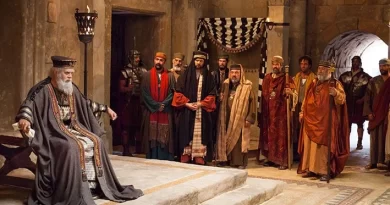The story of israel’s unbelief at kadesh – कादेश में इस्राएल के अविश्वास की कहानी
The Unbelief of Israel at Kadesh is a pivotal event in the Old Testament, found in Numbers 13-14. It tells the story of the Israelites’ failure to trust God’s promise as they reached the borders of the Promised Land. This act of unbelief led to severe consequences, including their prolonged wandering in the wilderness.
After escaping slavery in Egypt and receiving God’s law at Mount Sinai, the Israelites journeyed toward Canaan, the land God had promised to their forefather Abraham. When they reached the wilderness of Paran, near Kadesh-Barnea, they were on the verge of entering the Promised Land.
In Numbers 13, God instructed Moses to send twelve men, one from each tribe, to scout the land of Canaan. These men were to explore the land, assess its fertility, and observe its inhabitants—whether they were strong or weak, few or many. Among the twelve spies were two notable figures: Joshua, from the tribe of Ephraim, and Caleb, from the tribe of Judah.
The spies spent 40 days exploring Canaan. They traveled through various regions, including Hebron, and gathered fruit, bringing back a cluster of grapes so large that it had to be carried on a pole by two men, along with pomegranates and figs.
When the spies returned, they gave a mixed report. They confirmed that Canaan was indeed a land flowing with milk and honey as God had promised, showing the fruit as evidence. However, ten of the spies focused on the strength of the Canaanite people, describing them as giants (the descendants of Anak), and stating that their cities were heavily fortified. These spies spread fear among the Israelites, saying, “We seemed like grasshoppers in our own eyes, and we looked the same to them” (Numbers 13:33).
Only Joshua and Caleb gave a positive report. Caleb urged the people to trust God and said, “We should go up and take possession of the land, for we can certainly do it” (Numbers 13:30). However, the other ten spies insisted that they could not conquer the land, spreading doubt and fear among the people.
In Numbers 14, the people of Israel reacted with fear and despair. They cried out against Moses and Aaron, accusing them of leading them into the wilderness to die. They even suggested choosing a new leader and returning to Egypt. This marked a complete rejection of God’s promise to bring them into the land of Canaan.
Moses, Aaron, Joshua, and Caleb tried to convince the people to trust in the Lord’s power and protection. Joshua and Caleb declared, “The Lord is with us; do not be afraid of them” (Numbers 14:9). Despite their pleas, the Israelites refused to listen and even talked about stoning Joshua and Caleb.
At this moment, God’s glory appeared at the Tabernacle, and He spoke to Moses. God expressed His anger at the Israelites’ constant rebellion and unbelief despite the many miracles He had performed for them, from the plagues in Egypt to parting the Red Sea and providing manna in the wilderness.
God threatened to destroy the people and start over with Moses, making him into a great nation. However, Moses interceded for the people, pleading with God to spare them for the sake of His name and His promise to the patriarchs, Abraham, Isaac, and Jacob. Moses asked God to show mercy, even though the people had sinned.
God agreed to spare the people from immediate destruction but declared a severe punishment. Because of their unbelief, none of the adults who had left Egypt, except for Joshua and Caleb, would enter the Promised Land. Instead, they would wander in the wilderness for 40 years, one year for each day the spies had spent exploring Canaan. This generation would die in the wilderness, and only their children would inherit the land.
Realizing their mistake, the Israelites tried to repent and decided to go up and fight for the land without God’s blessing. Moses warned them that it was too late, but they ignored him and went to battle against the Canaanites. Without God’s support, they were defeated and driven back.
The story emphasizes the importance of trusting God’s promises. Joshua and Caleb demonstrated faith, while the rest of the spies and the people succumbed to fear.
Israel’s refusal to believe in God’s power resulted in their punishment—40 years of wandering and the loss of an entire generation. Unbelief can prevent people from receiving God’s blessings.
Although God was angry with Israel, He showed mercy by not destroying them completely, but His justice required that their disobedience be punished.
Moses’ role as a leader and intercessor for the people is highlighted. He stood in the gap and pleaded for God’s mercy on behalf of the rebellious Israelites.
The Unbelief of Israel at Kadesh is a powerful story about the consequences of doubting God’s promises. It highlights how fear and lack of faith can lead to rebellion and loss of God’s blessings. It also serves as a reminder that God is both just and merciful, rewarding faithfulness and punishing disobedience.
The story of israel’s unbelief at kadesh – कादेश में इस्राएल के अविश्वास की कहानी



